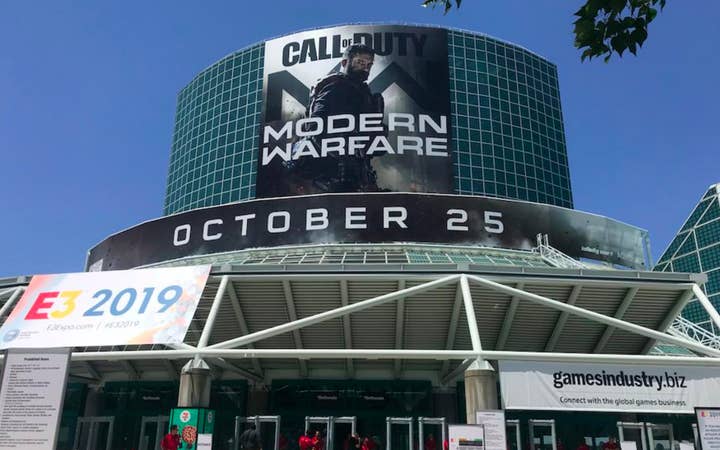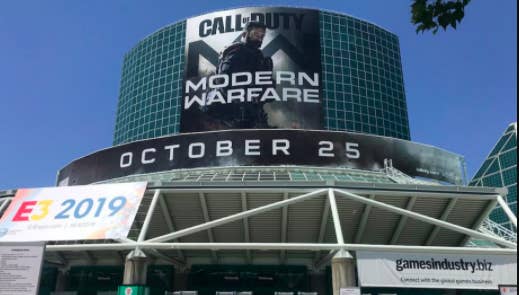Is this the end of E3? | Opinion
E3 faces new competition, an identity crisis and uncertainty around physical events
To most people, the question over whether E3 is dead or alive is an irrelvant one.
In real terms, E3 is a physical event. It is two big halls (and some smaller ones) located in Downtown Los Angeles. There are some booths and a press room and some private meeting spaces. That is E3.
To everyone at home, E3 is more a concept. A series of press conferences and digital videos that reveal the next big wave of video games. The ESA, E3's owners, never had any ownership over this bit. The PlayStation, Xbox and Nintendo conferences existed outside of the show. So when the pandemic came along and ended live events, which meant there was no need for press registration, or catering, or screens, or security, or furniture, the role that the ESA provided was no longer required.
E3 is a global brand, and it made sense to at least try a digital event. And last year's show was an ambitious and valiant effort. But when all was said and done, it found itself in fifth position. If you're a developer that wants to get your game in front of a big audience, you would naturally prefer a slot during Nintendo, Xbox or PlayStation's events, or Geoff Keighley's multiplatform Summer Games Fest. As a result, it's no surprise that E3 decided against doing it again this year.
"E3 still offers something that no other event really delivers: It's a glamerous show that brings in the world's media"
The question is that when physical events do return fully, where does E3 find itself? Because it was a challenged brand even before the pandemic. E3's role was to be the place where the industry could play the games that had just been announced. It was for retailers who might stock them, media who might write about them, toy manufacturers who might licence them, and so on. But as games publishers have learned to bypass retail with digital distibution, and with developers now speaking directly to fans via social media, the role of E3 has been diminishing.
The solution appeared to be to invite consumers in, but E3 never fully committed. And it isn't a great show for gamers. Most of the new titles weren't playable, many were behind-closed-doors and there were limited things for fans to actually do. Business audiences and consumer audiences have different needs. That's why Gamescom seperates the two. The European expo is a fantastic business show and a great consumer event, and it achieved that by effecively building two different conventions that just happen to take place in the same location.
I said at the start of this article that the fate of E3 is irrelevant to most people, because E3 the concept -- that period in June where games get announced -- is still very much alive. Geoff Keighley's Summer Games Fest, which is primarily a two-hour show of big game reveals and trailers, has helped maintain this moment in the industry calendar. If Nintendo, PlayStation, Xbox and Ubisoft follow Keighley's show, like they did last year, then what's the difference for those watching from home? It might carry a different name, there might be a little less press coverage, but for the majority of people not in LA, who cares?
Summer Games Fest is a more relevant digital event, led by a media personality that knows this stuff instinctively. If the event adds a physical component, and there are suggestions it might, then E3 has a genuine competitor to go along with its identity crisis.
There's also a legitimate question as to whether people even want the physical component anymore. Physical events are better than digital events. You just don't get those serendipitous moments in the digital space, where you might discover a new client at the bar or be introduced to someone by chance. But that doesn't mean digital events are ineffective. You can hold investor and licensor meetings online, you can demonstrate games over video, and you can get press hands-on with games via cloud services. You lose something with digital shows, but not everything. And they're certainly more affordable, sustainable and accessible.

So with a growing competitor, uncertainty around physical events, and the need for a new purpose, E3 has a real task ahead of it. And that's without mentioning the fact certain big publishers had grown frustrated with the show and stopped coming, and the media remains unhappy (and in some cases furious) after a 2019 data breach saw their personal information leaked online.
And yet E3 still offers something that no other event has managed to deliver. It's a glitzy show that brings in the world's media. I genuinely think Gamescom is the best video games convention on the planet, but it lacks the media reach and glamour of E3. At one E3, I ran into Jack Black, watched Blink-182 perform live at a conference, and had a demo cancelled because Kanye West wanted to play. The closest experience I've had at Gamescom was seeing German leader Angela Merkel play Farming Simulator. One of those events catches the eye of the world, and one of them... not so much.
As a Brit, I like going to E3 and seeing the world come together. The UK games industry can feel close to the US in many ways, and I don't just mean in terms of a shared language. Most of our games media is under US ownership. Our biggest games and most famous developers -- from Rare to Rockstar to Rocksteady to other studios not being with R -- all have big American owners. I find real value in going over there and meeting my colleagues in the US.
"Who won E3? is a question that gets asked after every show, and the answer should really be 'everyone', but it rarely is"
And I find it insightful to mix with my peers from Europe and Australia. At every E3 I catch up with Famitsu to swap notes, at the last show I befriended a German business journalist during an Xbox interview, I went to lunch with a US Youtuber and I visited a bar with an Australian TV crew. I don't get such varied, global viewpoints anywhere else.
Of course, so much of this is down to the announcements. A games event where all the big consoles and games are revealed is naturally going to appeal to worldwide mainstream media more than the others. If Summer Games Fest is the new home for the big game reveals, perhaps it can facilitate some of that global connection, too. If it feels it's worth it.
Whatever the future holds, I just hope E3 -- or whatever entity exists in its place -- can do a good job of uniting the games industry. It may physically bring people together, but recent E3s have been increasingly divisive, amongst publishers, media and entire sectors of the industry. And online discourse has become overly critical and even downright toxic. The console war 'banter' of previous years has descended into death threats and abuse, and E3 has become a battleground for fanboys. 'Who won E3?' is a question that gets asked after every show, and the answer should really be 'everyone', but it rarely is.
You can't control the internet, but there are ways of cooling some of the rhetoric. One of the best things about Geoff Keighley's shows -- whether it's Summer Games Fest or the Video Game Awards -- is that they often feature Nintendo, Xbox and PlayStation on the same stage. It's a show that brings all the tribes together, at least on camera.
For many in games, E3 has been long dead. A dinosaur of a show that refused to evolve sufficiently and only caters for a small part of an increasingly consolidating industry.
They may be right. But I recall vividly an interview I had with Tom Kalinske, the former boss of Sega America, about the formation of E3. He told me about the time the games industry used to go to CES -- in the early 1990s -- and how they often felt mistreated. One year they were even stuck outside in the rain. So after the formation of the ESA (at the time called the IDSA), the heads of the games industry decided to create their own show. "We felt we were important enough to have our own show that brought everyone together."
27 years on, I still think that's true.

